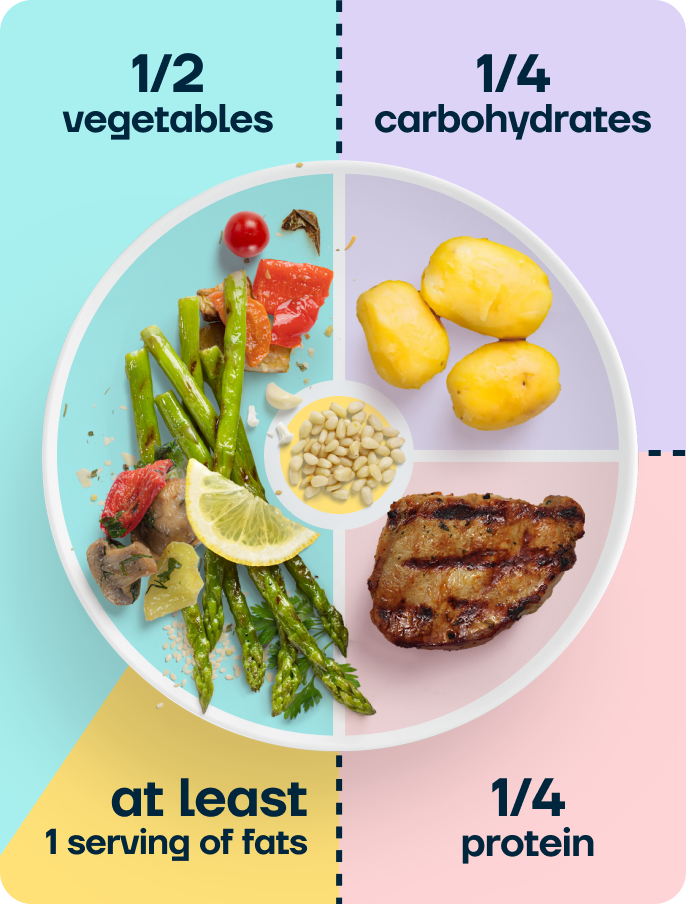Jump to: The best Ozempic foods | How many calories do I need to eat on Ozempic? | How quickly will I see results with Ozempic? | How much weight do people typically lose with Ozempic?
For optimal results with Ozempic, a balanced diet based on whole foods that minimises the intake of ultra-processed foods is recommended.
However, there’s no research comparing different diets alongside Ozempic. So, it’s unclear whether a low-carb or low-fat diet, for example, would be best to follow while on Ozempic.
The best foods to eat on Ozempic
On Ozempic, we recommend adding the following foods to your diet:
- High-quality protein sources: Fish, meat, eggs, tofu, tempeh, yoghurt, cheese, and seafood.
- Fat from whole foods: Meat, fish, eggs, dairy products (rich in calcium), nuts, seeds, avocado, and extra virgin olive oil.
- High-fibre complex carbohydrates: Whole grains like quinoa and brown rice, sweet potato, white potatoes, pumpkin, legumes like lentils, chickpeas, beans, and butternut squash.
- Fruits and vegetables: Take your pick; variety is key.
On Ozempic, we recommend limiting the consumption of these foods:
- Ultra-processed foods: Most boxed cereals, supermarket bread and pastries, fast food, microwave meals, oven pizza, crisps, biscuits, fizzy drinks, and supermarket sandwiches.
- Added sugar
- Refined carbohydrates: White pasta, white rice, and oats
- Refined vegetable oils like sunflower

You can watch our video below or read our complete guide for a detailed review of a balanced diet here.
How many calories do I need to eat on Ozempic?
There’s no set calorie target whilst taking Ozempic, but you’ll likely be eating 1200-2000 calories per day whilst on Ozempic due to the impact of the medication on lowering appetite.
Ozempic interacts with the brain to lower appetite and reduce hunger, helping you eat fewer calories.
Additionally, you may find it challenging to overeat as this can cause more severe GI-related symptoms such as bloating, cramping, and even vomiting.
Ozempic can lead to GI-related side effects due to its impact on the gut. It slows gastric emptying (how quickly food leaves the stomach) and causes gut distension (an enlargement of the gut).
The symptoms related to these effects on the gut can be worsened by overeating whilst on Ozempic, leading you to lower your food intake naturally.
How quickly will I see results with Ozempic?
According to data from randomised controlled trials, Ozempic tends to support immediate weight loss.
Semaglutide reduces appetite and hunger, helping you eat fewer calories; this effect is almost immediate. However, you might notice the effect of lower hunger wearing off after 4-5 days post-injection in the first month of taking Ozempic.
Interestingly, the initial weight loss you see while taking Ozempic is no different to other weight loss treatments or the impact of diet interventions on weight loss. The real effect of Ozempic is seen beyond three months.
Semaglutide is a long-acting medication that’s started at a lower dose to reduce the number and severity of side effects as it’s built up to a higher maintenance dose.
How much weight do people typically lose on Ozempic?
Research suggests that Ozempic supports average weight loss of around 6kg after 40 weeks. However, as this is an average, it’s unclear how much weight each individual will be able to lose on Ozempic.
The amount of weight people lose on Ozempic will depend on how well they respond to the medication and their ability to make positive changes to their diet and lifestyle.
Ozempic isn’t a magic pill
Weight-loss injections are designed as additional tools for weight management interventions and shouldn’t be considered lifelong medications.
Instead, they should be used to help you kickstart your weight loss and healthy journey while you commit to living a healthier lifestyle.
Consider the use of antidepressants for people living with depression. They’re not designed to cure the condition. Instead, they’re designed to allow room for therapy to treat the condition’s underlying cause.
Ozempic and other weight loss injections, like Mounjaro, are similar. They can allow you to make lifestyle changes to support long-term weight loss maintenance.
Ozempic can help silence food-related thoughts and also give you a boost of confidence with more immediate weight-loss results.
This helps to buy you the time and headspace to understand why your body may have struggled to lose weight previously, and to build new long-term healthy habits.
The core focus of our medication programmes is to calm down the feeling of food noise, lower your cravings, and allow you to build healthier habits to keep the weight off for good.
The ultimate goal is to make losing weight feel second nature.
Second Nature’s medication programme
Second Nature currently provides Mounjaro as part of our Mounjaro weight-loss programme. Ozempic is no longer available in the UK for weight loss.
Why should you choose Second Nature over other medication providers if you’ve decided to try Mounjaro (assuming you’re eligible)?
For peace of mind.
Second Nature has worked with the NHS for over 6 years providing weight-loss programmes across the UK.
While our Mounjaro weight-loss programme is private and not currently used by the NHS, we’ve built the programmes focusing on scientific evidence, patient safety, and data security.
We hope that our 6+ years of working with the NHS and building a track record of effective weight-loss results will give you peace of mind to give us a try.
Please note: We generally recommend speaking with your GP/doctor before you start taking any new medication like Mounjaro. If you do sign up for Second Nature's Mounjaro programme, then we'll also send your GP a letter to let them know you've started a medication-supported weight-loss journey.




